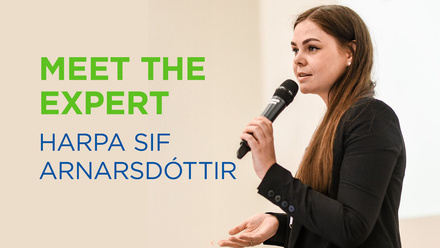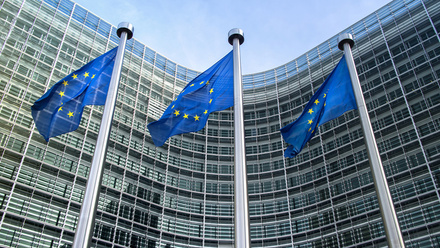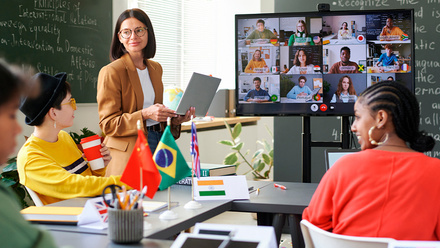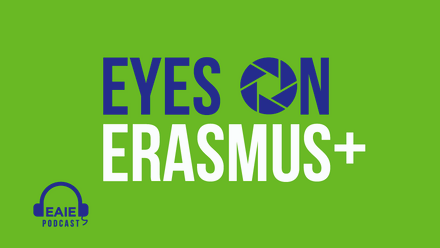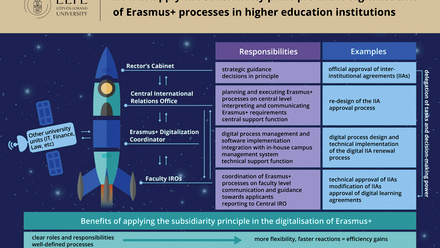Youth engagement in European politics: Looking ahead to the European elections

As we reach the final countdown towards the European Elections, the issue of youth engagement is brought back in the headlines: will they vote and, if so, will they defend the European project?
No one would disagree with the importance of promoting youth engagement in the European elections. In fact, the perceived structural lack of young people's participation in European elections is exaggerated, with a double-digits increase in turnover in 2019. Despite all good intentions, lecturing young people for months in an effort to convince them of the importance of politics will not strike a chord for most.
At the European Students’ Union (ESU), we believe that the two key issues that ensure youth engagement are:
-
Promoting policies that matter to them.
-
Creating a broad culture of participation in democratic processes outside elections.
For the first issue, the ESU has focused on advocating for European political parties to take up election commitments that are relevant for students. Our manifesto was first published in November 2022. In the meantime, we engaged with political parties through an event organised in Brussels called ‘Students emPower education’, where we brought student leaders, three secretary generals of European parties and candidates for various offices (President of the European Commission, MEPs) face-to-face. If mainstream parties do not address problems that various young people face; endorse practical solutions; communicate in the style of young people and via the channels that they use (such as online); and are not accountable through their transparency and results, many young people may choose either to skip the elections or vote for radical parties.
Lack of participation, or solely tokenistic participation, not only turns young people away, but decreases their trust and confidence in democratic processes overall, leaving them disappointed.
Democratic engagement is like buying from Ikea: You need to do-it-yourself
The second issue promotes young people's participation in decision-making processes, which enables and empowers them to become active contributors in shaping their future and the world in which they live. Lack of participation, or solely tokenistic participation, (be it in the EU, local communities or schools and universities) not only turns young people away, but decreases their trust and confidence in democratic processes overall, leaving them disappointed. For many, schools and universities are not only the first place where people learn about the civic space, politics or the EU, but also where they first practise democracy in participatory spaces. Improving student participation at all levels is a core aspect of ESU’s work, as is promoting democratic citizenship competencies through higher education. Even more important now due to the international challenges that society faces, democratic citizenship competencies need to have an international dimension.
The most palpable programme which can promote youth participation in European Elections is Erasmus+ – and not just because of its visibility. Mobile students benefit from international experiences in their learning path and career, and take advantage of the social benefits of international mobility such as multiculturalism, multilingualism and embracing diversity. Furthermore, they also create a stronger identity as Europeans, alongside their regional or national identity. Due to their closer ties to Europe, they develop a deeper understanding and increased interest, consequently leading to a better comprehension of shared values, common culture, and political systems, while still retaining their individual characteristics. To support this, mobile students should be guided towards opportunities for non-formal learning outside the study programme (and mobile students during elections should be allowed to vote easily!).
In many cases non-formal education is more effective in equipping young people with transversal skills, including critical thinking (much needed to combat disinformation) and motivating them to take initiative. For this reason, we are also promoting youth engagement through non-formal activities: last year we raised awareness among young people with our initiative "Be an MEP for one day", which sought to boost awareness about how the European Parliament functions, and why their voices matter in the election. As a follow-up activity, we supported four young people to develop their own awareness campaign on the upcoming European Elections.
You want to hear more about it? Keep reading
"This project gave us the chance to address a passion of ours. We're grateful for the grant that allowed us to make a difference in our communities. The campaign won't stop today; it'll evolve with new initiatives and projects."
- Lucian Cismaru
Lucian Cismaru and his colleagues from the National School Students Council of Romania created "YOUth Vote ‘24". It tackled the low turn-out of Romanian youth in any type of election by raising awareness, targeting students with information about the impact of the decisions taken by institutions and how citizens can influence policies. This campaign started with a bottom-up approach, from the national level to local communities, through the network of the Romanian National School Students Council.
Lucian highlighted that one of their biggest results was the increase in young people's willingness to vote in 2024. He specifically mentioned that "before the project, 49,6% of the students in Bucharest didn’t want to vote in 2024, while, after the implementation of our project, the percentage fell down to 35%". One notable conclusion that they drew from the implementation of this event was that 70.5% of the youth in Bucharest are involved in their communities through various means such as volunteering. However, young people are not informed about European elections, with the 2024 round being the least well-known.
"Some of the youths' conditions were challenging; some hadn't eaten in two days, and all had slept less than six hours each night. Nine fell asleep during the session due to exhaustion, reflecting governmental failure."
- Joao Bras
Joao Bras and his colleagues from the Portuguese organisation Youth for Change (Y4C) organised ‘Equality Here Now' to raise awareness of the lack of non-formal education (NFE) in schools, developing citizenship competencies and talking about the EU. In partnership with Europe Direct AML, he and his team taught around 500 youngsters in rural areas in Portugal. One key element was its focus on underrepresented groups. They visited schools in impoverished areas to engage with a wider range of disadvantaged youth, and also visited schools in more affluent areas, understanding the significant underrepresentation of young people in Portugal.
At the ESU we focus on disadvantaged groups in everything we do. However, it is even more important to keep their voices at the forefront during election processes as statistics show disadvantaged people vote less often than their peers. However, their unique experiences and perspectives hold the power to shape the policies that reflect how diverse our society is. When we actively listen to and uplift these voices, we not only honour the principles of equality and fairness but also ignite the flames of change.
Joao highlighted that "it was remarkable to observe the effectiveness of leaving the classrooms and conducting sessions outdoors, such as in courtyards. This approach significantly enhanced both the sessions and the learning outcomes."
The campaign for 2029 starts in July 2024
As in 2019, in preparation for the 2024 elections many organisations have created synergies, built-up networks, scaled-up good practices, produced insights and engaged young people. It is essential that decision-makers make use of this knowledge base and ecosystem. This can be done by ensuring adequate youth participation in decision-making from day 1, and supporting the role of schools and HEIs. Likewise, it is important to increase the funding of Erasmus+, recognise and promote non-formal education and, above all, promote reforms in accordance with the aspirations of young people.


